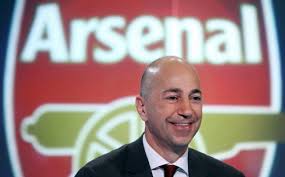By David Owen
September 18 – Arsenal, the North London football club, have announced a five-fold increase in annual profits thanks in part to its property business. This property arm contributed £13.4 million – or just over half – to a pre-tax profit for the Arsenal Holdings group of £24.7 million for the year ended 31 May 2015.
This compared with a profit of £4.7 million the previous year. The club, which has won the FA Cup for the past two seasons, also made more than four times as much profit – £28.9 million against £6.9 million – from selling players than during the 2013-14 financial year. Disposals included that of Belgian defender Thomas Vermaelen, sold to Barcelona in August 2014 for a reported £15 million.
Annual turnover from football jumped beyond the £300 million barrier, climbing from £298.7 million to £329.3 million. Revenues from commercial activities soared by more than a third to £103.3 million, spurred by a new kit partnership with Germany’s Puma.
The club, sometimes criticised in recent years for not assembling a strong enough squad to make it a realistic challenger for the Premier League or Champions League titles, spent a record £114 million on new players such as Alexis Sánchez and Calum Chambers in the period, prompting wage costs to jump more than 15% to £192.2 million. In spite of this, cash reserves rose by close to £20 million to £193.1 million.
Sir Chips Keswick, chairman, said the club was in “a robust position across all the key areas of our activities”, while Ivan Gazidis (pictured) , chief executive, explained that the Gunners “continue to look to develop every aspect of our operations while remaining true to our principles around being self-funding, investing in youth, our style of play and our commitment to our fans and to our place in the community”.
Gazidis emphasised: “We are focused on delivering more success.”
The club is the second Premier League outfit after Manchester United to report its 2014-15 financial results, and, like United, it did so after suffering a disappointing start to its 2015-16 Champions League campaign, losing 2-1 to Dinamo Zagreb.
While a large number of Premier League clubs look set for another profitable year after the striking financial turnaround of 2013-14, these first two sets of figures raise the possibility that aggregate match-day revenues of the 20 Premier League clubs could prove to have risen only marginally in 2014-15 from a year-earlier, or conceivably even to have declined.
United’s were well down owing to the lack of European competition, while Arsenal’s edged only fractionally ahead from £100.2 million to £100.4 million. While the last few months have brought improvement, living standards in the UK have been under considerable pressure for an extended period. This, in turn, has ratcheted up pressure on clubs to keep ticket prices down, even when there are few, if any, empty seats.
Contact the writer of this story at moc.l1745222029labto1745222029ofdlr1745222029owedi1745222029sni@n1745222029ewo.d1745222029ivad1745222029

